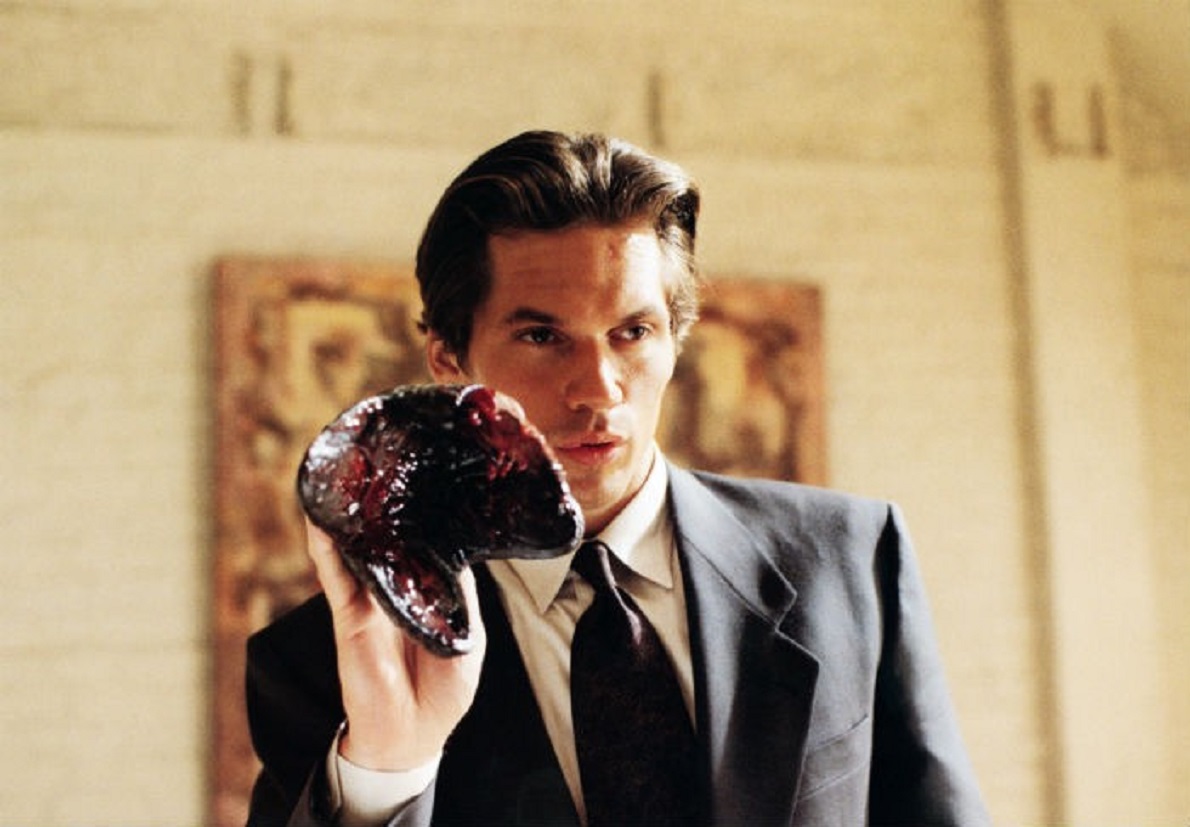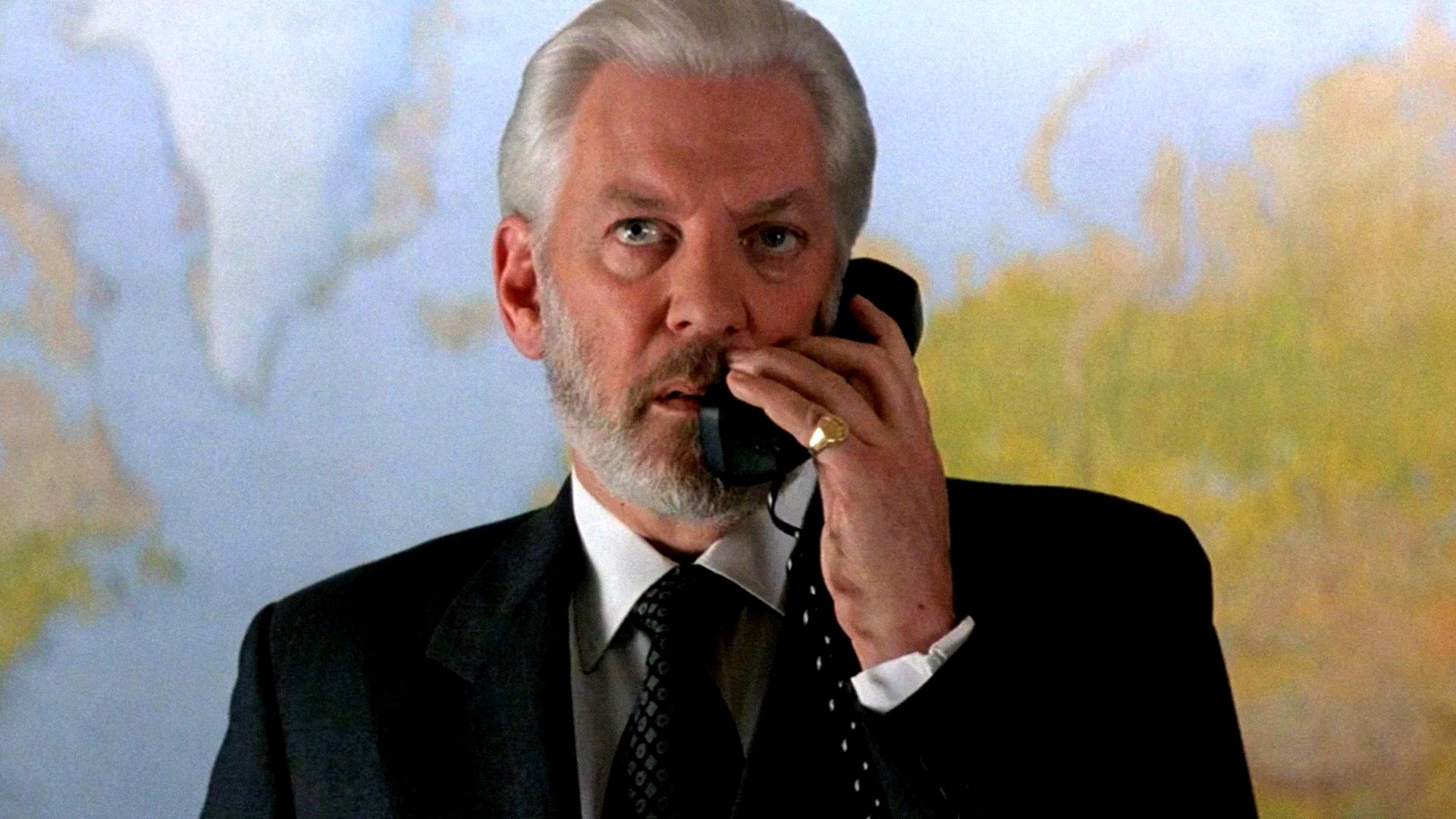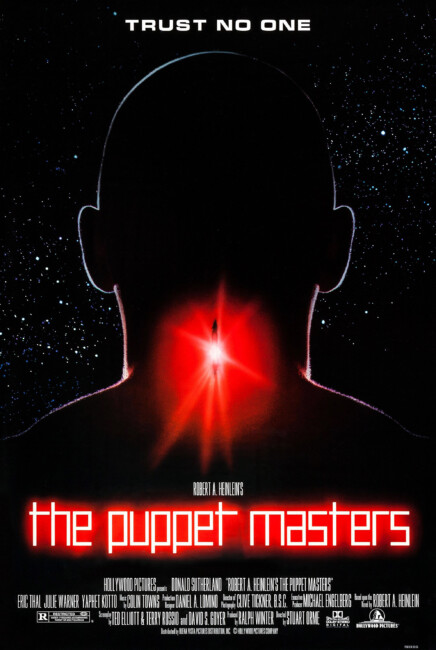USA. 1994.
Crew
Director – Stuart Orme, Screenplay – Ted Elliott, David S. Goyer & Terry Rossio, Based on the Novel by Robert A. Heinlein, Producer – Ralph Winter, Photography – Clive Tickner, Music – Colin Towns, Visual Effects – Buena Vista Visual Effects (Supervisor – Peter Montgomery), Special Effects Supervisor – Roy Arbogast, Makeup Effects – Greg Cannom, Mechanics/Animatronics – Larry Odien, Production Design – Daniel A. Lomino. Production Company – Hollywood Pictures.
Cast
Eric Thal (Sam Nivens), Donald Sutherland (Andrew Nivens), Julie Warner (Dr Mary Sefton), Keith David (Alex Holland), Will Patton (Graves), Yaphet Kotto (Ressler), Marshall Bell (General Morgan)
Plot
Sam Nivens, an agent for the Office of Scientific Intelligence, joins his father Andrew and xenobiologist Dr Mary Sefton to go to Ambrose, Iowa. There a tv station initially reported a UFO sighting but later announced that it was a hoax created by three boys. In investigating, the group believe that something suspicious is going on. The tv station manager pulls a gun on them. In the process of stopping the manager, the group capture a creature that emerges from his back. Back at OSI headquarters, they determine that this is an alien parasite that takes over a human host by digging tendrils into neural tissue via the back. They then discover that the parasites have taken over Des Moines. As the parasites start spreading across the country, the group struggles to find a means of fighting back.
Robert A. Heinlein (1907-88) was one of the grandmasters of literary science-fiction and is considered by many one of the greatest science-fiction writers of all time. Robert Heinlein produced numerous books throughout his five decade career, which include Methuselah’s Children (1958), Have Spacesuit, Will Travel (1959), Starship Troopers (1959), Stranger in a Strange Land (1961), Glory Road (1963), Farnham’s Freehold (1965), The Moon is a Harsh Mistress (1966) and Time Enough for Love (1973). Heinlein is a contentious figure among science-fiction fandom, in particular for his politics that embrace hard-line libertarianism and right wing issues – among other things, Heinlein ardently defended Senator McCarthy’s Communist Witch Hunts. Many of Robert Heinlein’s works from the 1970s onwards became bloated and taken over by social and personal philosophy. On the other hand, Heinlein was an ardent supporter of sexual liberation, including arguing for a number of non-traditional forms of sexual relationships. He also created strong roles for women in science-fiction in an era when women had a traditionally subservient role. Heinlein’s legacy to science-fiction will always be in having driven a move away from the space opera of the 1930s to a focus on the social aspects of science-fiction – in the 1940s, Heinlein stunned readers by printing a detailed Future History that all of his stories would purportedly fall into – and in a focus on rigorously credible science.
Robert Heinlein’s The Puppet Masters (1951) is a classic work – although perhaps not one of Heinlein’s true classics like Starship Troopers or Stranger in a Strange Land. One of the important historic notes about The Puppet Masters is that it prefigured the alien body snatchers fad that came in 1950s films such as Invaders from Mars (1953), It Came from Outer Space (1953), Invasion of the Body Snatchers (1956) and I Married a Monster from Outer Space (1958). Many of these have rightly or wrongly been interpreted as allegories about Communism. Where the case to be made in the films is mostly an ambiguous one, Heinlein made it overt in The Puppet Masters – while the setting for the story is the US, it is stated that the parasites have taken over the Communist countries well before this. The Puppet Masters was previously filmed during the 1950s as the very cheap body snatchers film The Brain Eaters (1958), although Heinlein received no credit and later sued the film’s producers for plagiarism. [The Puppet Masters should not in any way be confused with Full Moon’s Puppetmaster (1989) and any of its nine sequels about a horde of malevolent living puppets].
This film adaptation of The Puppet Masters came out amidst a new mini-fad of alien body snatcher films that emerged in the 1990s following the popularity of tv’s uber-paranoid The X Files (1993-2002, 2016-8). There were a number of revivals of other classic body snatchers films during this time, including Abel Ferrara’s remake of Body Snatchers (1993), the tv mini-series revival of The Invaders (1995), It Came from Outer Space II (1995), John Carpenter’s remake of Village of the Damned (1995), the tv movie remake I Married a Monster (1998) and other original films such as The Arrival (1996) and Polymorph (1996) and mini-series like The Tommyknockers (1993), Invasion (1996), The Uninvited (1997) and Invasion: America (1998), before the genre was wittily spoofed in The Faculty (1998) (which also has a sly line acknowledging The Puppet Masters as the granddaddy of the genre).

Robert Heinlein’s book has been altered somewhat in its journey to the screen. The screenwriters keep faith and reasonably accurately replicate the main characters from the book and their relationships, although there are a number of noticeable changes. The book was set in the future where humanity had colonized the Solar System; the film has been set contemporary. There is also no reference made to the parasites coming from Saturn’s moon Titan. Most prominently gone is the means whereby it was decided that the only way humanity could be rid of the parasites was for the entire populace to walk around nude.
The screenplay underwent numerous rewrites from different creative hands, including the creative duo of Ted Elliott and Terry Rossio (see below for Elliott and Rossio’s other films), with later rewriting performed by David S. Goyer (see below for David S. Goyer’s other works). Terry Rossio detailed his frustrations with the development process of The Puppet Masters at his website Wordplayer.com, which makes for interesting reading, while director Stuart Orme later said the film was the one work he had made that he felt most disappointed with.
The Puppet Masters was not a huge success when it came out, although it conducts an occasionally worthwhile variant on the genre. The film tends to work more in individual moments than it does as an overall dramatic structure. One of the problems is that the story seems hurried and lacking in an effective build-up. Within the opening ten minutes, for instance, we go from a team of investigators exposing a cover-up about a UFO landing, detecting that people’s behaviour is changed (all because they do not look down a girl’s blouse), fighting off body snatching parasites and escaping from an entire alien-possessed town. A film like Invasion of the Body Snatchers by contrast took its entire 80-minute running time to cover all of this. The characters in the film seem to come post-informed by the body snatchers genre – they automatically seem to know what it going on and are prepared to fight it – and the rapidity of the progression is confusing. The film becomes far more interesting when it gets to the scenes with the agents chasing the parasite through the OSI offices. Thereafter there are some fine individual moments – the scenes with the possessed monkey leaving a taunting message for Eric Thal or where the alien parasite possess Thal and threaten to stop his heartbeat and tauntingly tells Julie Warner “what fantasies my host has of you.”

Eventually, the rapid changes of the plot also end up confusing if not exhausting. It seems that every major character in the film ends being possessed at some point – the effect is more like a game of musical chairs than films like Invasion of the Body Snatchers or Invaders from Mars, which end up progressively alienating through the accumulation of paranoid and unearthly mood. There are also plausibility holes – the parasite ends up killing every other person it is attached to except when it comes to the heroes – early on when taken over, Eric Thal seems to have a nervous breakdown but when it comes to the possession of Julie Warner and Donald Sutherland they are both cogent again in minutes. The father/son fight at the climax seems ineffectually tacked on – it is a weak wrap-up that fails to let the film go out on a suitably big dramatic punch.
Other film adaptations of Robert A. Heinlein’s works include his co-writing Destination Moon (1950), based on his juvenile novel Rocketship Galileo (1947); co-writing the original Project Moon Base (1953); the animated tv mini-series Red Planet (1994) from Heinlein’s juvenile; Paul Verhoeven’s bludgeoning adaptation of Starship Troopers (1997); the fine Predestination (2014) based on Heinlein’s classic time paradox short story __All You Zombies__ (1959); and the Japanese adaptation of The Door Into Summer (2021).
Director Stuart Orme was a British television director who had previously made the fine dark children’s fantasy The Wolves of Willoughby Chase (1989) for cinematic release. The Puppet Masters was Stuart Orme’s first and only venture into the American theatrical mainstream. Almost all of Orme’s other work has been in British television. His other genre works have included:- the award-winning tv mini-series The Sculptress (1996) from the Minette Walters thriller; a tv mini-series adaptation of Arthur Conan Doyle’s The Lost World (2001); the mini-series The Last Train (1999) about a trainful of passengers who are cryogenically frozen; the children’s story adaptation Fungus the Bogeyman (2004); the serial killer thriller Cold Blood (2005-6) and its sequel Cold Blood: The Last Hurrah (2007) and the haunted submarine tv movie Ghostboat (2006).
Ted Elliott and Terry Rossio’s other screenplays include Little Monsters (1989), Disney’s Aladdin (1992), the remake of Godzilla (1998), The Mask of Zorro (1998), Small Soldiers (1998), The Road to El Dorado (2000), Shrek (2001), Disney’s Treasure Planet (2002), Pirates of the Caribbean: The Curse of the Black Pearl (2003), Pirates of the Caribbean: Dead Man’s Chest (2006), Pirates of the Caribbean: At World’s End (2007), Pirates of the Caribbean: On Stranger Tides (2011) and The Lone Ranger (2013). Terry Rossio on his own co-wrote Deja Vu (2006) and Godzilla vs. Kong (2021).
David S. Goyer’s other screenplays include the Jean-Claude Van Damme action film Death Warrant (1990), Full Moon’s Demonic Toys (1992) and Arcade (1994), The Crow: City of Angels (1996), Blade (1998), Dark City (1998), Nick Fury, Agent of Shield (tv pilot, 1998), Blade II (2002), Batman Begins (2005), Batman: Gotham Knight (2008), The Dark Knight (2008), Jumper (2008), The Dark Knight Rises (2012), Ghost Rider: Spirit of Vengeance (2012), Man of Steel (2013), Batman V Superman: Dawn of Justice (2016) and Terminator: Dark Fate (2019). Goyer has also directed the excellent non-genre film ZigZag (2002) about an autistic boy, Blade Trinity (2004), The Invisible (2007) about a disembodied teenager and the possession film The Unborn (2009). Goyer has also produced the genre tv series’ Sleepwalkers (1997) about dream researchers; FreakyLinks (2000) about paranormal investigators; Threshold (2005) about the investigation of a UFO; the cinematic adaptation of the Marvel Comic Ghost Rider (2007); the tv series Flash Forward (2009-10) about a mysterious worldwide premonition; the tv series DaVinci’s Demons (2013-5) about a fantastical secret history of Leonardo Da Vinci; the tv version of Constantine (2014-5), the ghost story The Forest (2016), the robot dog film A-X-L (2018), the animated web series Constantine: City of Demons (2018), the Superman prequel tv series Krypton (2018-9), the A.I. film Tau (2018), the ghost story The Night House (2020). the wendigo film Antlers (2021), the tv series’ Foundation (2021- ) and The Sandman (2022- ), the remake of Hellraiser (2022) and The First Omen (2024).
(Winner for Best Makeup Effects at this site’s Best of 1994 Awards).
Trailer here


